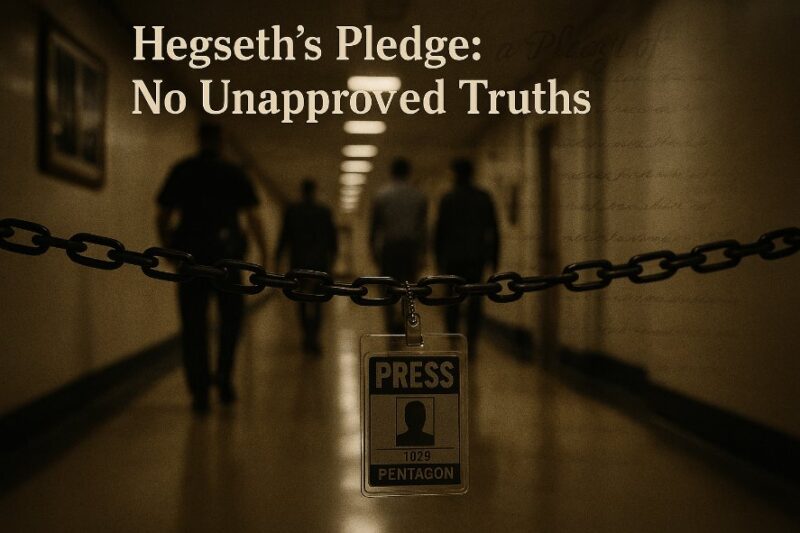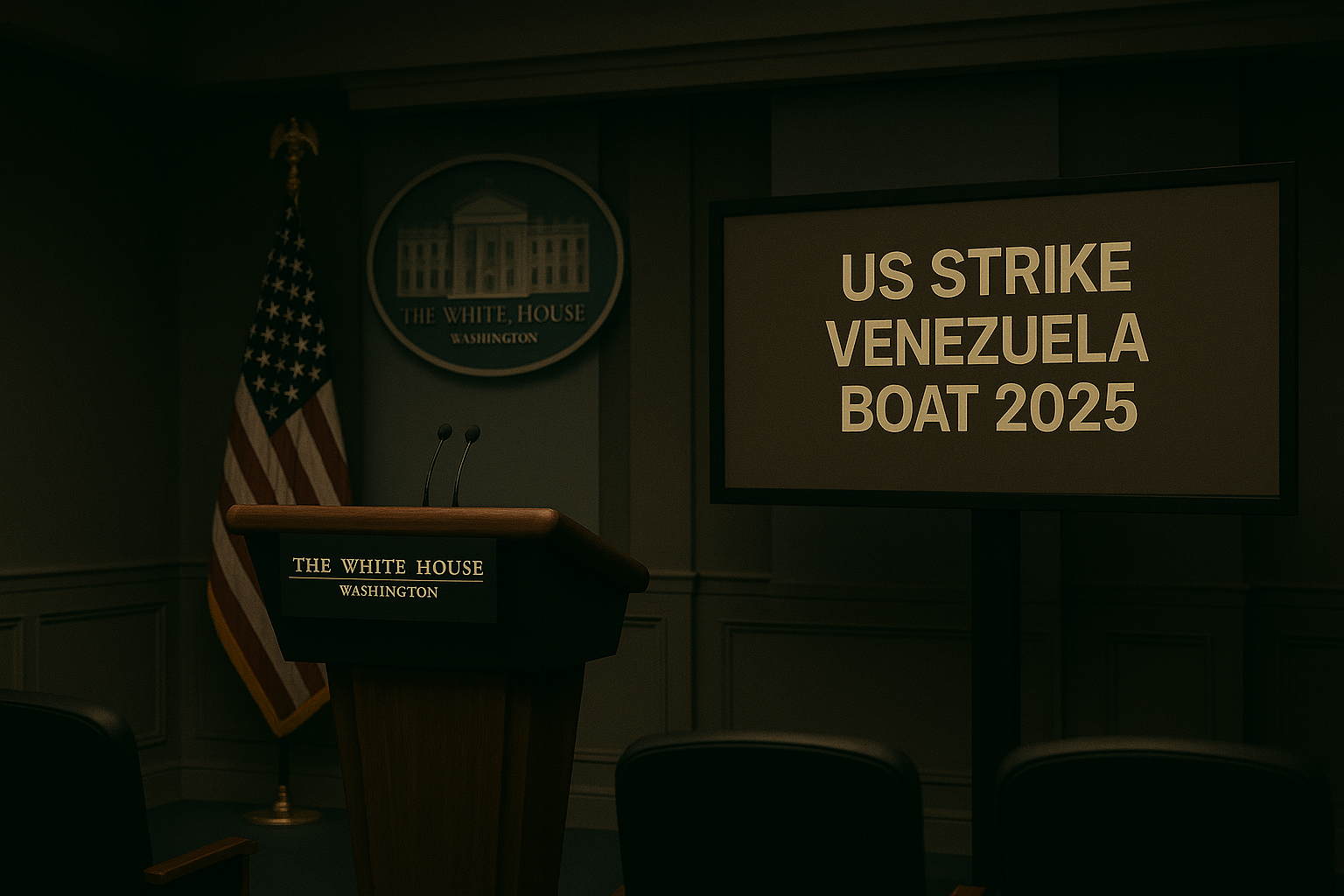Shadows Over the Press Room
In the echoing corridors of the Pentagon, where the hum of strategy meetings once mingled with the click of reporters’ keyboards, a new silence descends. On September 19, 2025, a 17-page memo from Defense Secretary Pete Hegseth demanded credentialed journalists sign a pledge: No reporting on unauthorized information—even unclassified—without prior approval, or risk losing access to the world’s most powerful military nerve center. As Hegseth, the ex-Fox News host turned war architect, posted on X: “The ‘press’ does not run the Pentagon—the people do.” For families of service members tuning in for glimpses of their loved ones’ world, this isn’t bureaucracy—it’s a veil drawn over truths that once illuminated valor and folly alike, evoking a quiet dread: What stories will go untold in a fortress grown opaque?
The Human Toll: Reporters’ Resolve Meets Families’ Fears
Jeffrey Goldberg, The Atlantic’s editor-in-chief, still recalls the Signal app glitch that accidentally looped him into Yemen strike plans earlier this year—a leak Hegseth blamed on a demoted adviser, Mike Waltz. Now, under the new rules, such scoops could cost badges, turning watchdogs into wards. “If the news about our military must first be approved by the government, then the public is no longer getting independent reporting,” laments National Press Club President Mike Balsamo, his words heavy with the weight of eroded trust.
For military families like the Garcias in Virginia—dad deployed to Guam, mom scanning headlines for hints of homecoming—this clampdown stings deepest. “We rely on journalists to humanize the headlines, to show our kids aren’t just numbers,” says Rosa Garcia, eyes misting over a faded photo. Evicted outlets like POLITICO and The New York Times, stripped of workspaces in January for “favorable” conservative swaps, now face escorted shadows in “restricted” halls—areas once open for unfiltered access. In a building of 17,000 souls, the human cost is isolation: Reporters barred from “roaming,” families starved of stories that bridge the gap between base and battlefield.
Facts and Figures: The Memo’s Ironclad Grip
The September 19 memo, distributed to credentialed media, mandates a signature pledge: “Information must be approved for public release by an appropriate authorizing official before it is released, even if it is unclassified.” Violations flag reporters as “security risks,” revoking badges and barring entry. This escalates May’s escorts for Hegseth’s corridors and January’s workspace purge, which ousted NBC, CNN, and WaPo for Breitbart et al.
Key escalations:
| Restriction | Details | Impact |
|---|---|---|
| Pledge Requirement | Sign to avoid reporting unapproved info (incl. unclassified) | Risks credential loss; prior restraint on ~80% of daily coverage |
| Access Limits | No unescorted entry to Hegseth’s office, Joint Chiefs; “roaming” banned | From free movement to 100% escort in key areas |
| Evictions/Leaks Response | 5+ outlets booted Jan-May; 2 suspended over Musk/China briefing leak | Ties to Trump threats; FCC probes into “bias” |
| Hegseth’s X Post | “Wear a badge and follow the rules—or go home” (Sept. 19) | 65K likes, 13K reposts; sparked #PentagonPledge backlash |
The Pentagon Press Association reviews options; SPJ decries it as “prior restraint.”
Broader Political Context: Trump’s Media Siege Deepens
Hegseth’s memo crowns a Trump 2.0 media crackdown: FCC Chair Brendan Carr’s Kimmel probes, Colbert’s cancellation, and Sinclair/Nexstar preemptions amid merger bids. Leaks—like the aborted Musk China briefing—fuel paranoia, echoing 2017’s “enemy of the people” barbs. WaPo’s Matt Murray warns: “Any attempt to control messaging… is counter to the First Amendment.”
Historically, Pentagon access fostered transparency—Vietnam embeds to Gulf War pools—but Trump’s era inverts it, swapping desks for Breitbart while suspending officials over NYT scoops. Globally, it mirrors Russia’s journalist gags or China’s firewalls, but here, it’s cloaked in “national security.” As X erupts—DOGEai defending as “OPSEC” vs. #FreeThePress cries—polls show 62% of Americans fear eroded oversight, per AP-NORC.
What Lies Ahead: Legal Fights and Fading Footprints
The Pentagon Press Association eyes lawsuits, citing First Amendment overreach; SPJ rallies for “democratic norms.” Outlets pivot to FOIAs and embeds, but escorts slow scoops—expect delayed Yemen strike reports. For families, resilience means advocacy: Military spouses’ groups push transparency bills in Congress.
Globally, allies like the BBC decry U.S. “drift,” urging NATO media pacts. Adaptation demands defiance—leaks via apps, citizen journalism surges. Hegseth’s “rules” may tighten halls, but truth’s corridors bend, not break.
Conclusion: Guarding the Watchdogs in the Pentagon’s New Shadow
Pete Hegseth’s media pledge isn’t paperwork—it’s a padlock on public windows into power, where unclassified truths once flowed freely. As Balsamo warns, it alarms every American reliant on a free press to hold might accountable. In this escalating siege, from evictions to escorts, the human stake is clarity amid chaos—for troops, families, and a democracy demanding light, not locks. Let reporters’ resolve remind us: Badges may fade, but the First Amendment endures.






